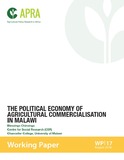| dc.contributor.author | Chinsinga, Blessings | |
| dc.coverage.spatial | Malawi | en |
| dc.date.accessioned | 2018-08-30T09:19:06Z | |
| dc.date.available | 2018-08-30T09:19:06Z | |
| dc.date.issued | 2018-08-01 | |
| dc.identifier.citation | Chinsinga, Blessings (2018) The Political Economy of Agricultural Commercialisation in Malawi, APRA Working Paper 17, Future Agricultures Consortium | en |
| dc.identifier.isbn | 978-1-78118-474-5 | |
| dc.identifier.uri | https://opendocs.ids.ac.uk/opendocs/handle/20.500.12413/14028 | |
| dc.description.abstract | This paper examines the political economy of agricultural commercialisation in Malawi over the past three or so decades both in a contemporary and historical perspective. Drawing insights from Keeley and Scoones (2003) and Chinsinga and Poulton (2014), the underlying argument of this paper is that the twists and turns in the country’s agricultural commercialisation processes have been shaped and influenced to a very large extent by the changing configurations of political elites and their underlying interests, incentives and motivations, including the influence of donors, especially since the transition to democracy in May 1994. The manner in which agricultural commercialisation has been conceived, contested and promoted has reflected either the degree of attachment or detachment of the political elites to the agricultural sector as a source of political patronage, fraud and corruption. Overall, however, the texture of agricultural commercialisation is very much shaped and influenced by debates about the land question and competing notions of how food security can be achieved and guaranteed at national and household levels. For example, the contemporary vision of large-scale agriculture as the primary driver for agricultural commercialisation has not been effectively implemented due to pervasive chronic food security challenges since the late 1990s, epitomised by the implementation of the Farm Input Subsidy Programme (FISP) and the political sensitivity of the land question upon which its success depends. The commercialisation agenda is further dictated by the primacy of politics over ideas, which makes it extremely difficult for policymakers to forge ahead with the practical implementation of certain ideas because they are generally seen as being less politically expedient. The conclusion is that transformative and sustainable agricultural commercialisation can only stick if the questions of land tenure and ownership, as well as food insecurity, are addressed in a manner that creates win-win scenarios for all key stakeholders. | en |
| dc.description.sponsorship | UKAID | en |
| dc.language.iso | en | en |
| dc.publisher | APRA, Future Agricultures Consortium | en |
| dc.relation.ispartofseries | APRA Working Papers;17 | |
| dc.rights.uri | http://creativecommons.org/licenses/by-nc-nd/3.0/ | en |
| dc.subject | Agriculture | en |
| dc.subject | Development Policy | en |
| dc.subject | Economic Development | en |
| dc.subject | Poverty | en |
| dc.subject | Rural Development | en |
| dc.title | The Political Economy of Agricultural Commercialisation in Malawi | en |
| dc.title.alternative | APRA Working Paper 17 | en |
| dc.type | Series paper (IDS) | en |
| dc.rights.holder | APRA, Future Agricultures Consortium | en |
| dc.identifier.team | Rural Futures | en |
| dcterms.dateAccepted | 2018-08-01 | |
| rioxxterms.funder | Department for International Development, UK Government | en |
| rioxxterms.identifier.project | APRA | en |
| rioxxterms.version | VoR | en |
| rioxxterms.funder.project | e1f6d3be-457a-4f13-8b1f-6748d1402d83 | en |


